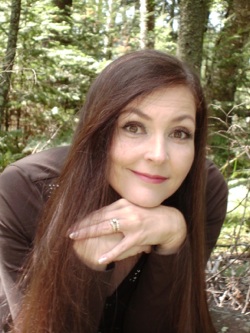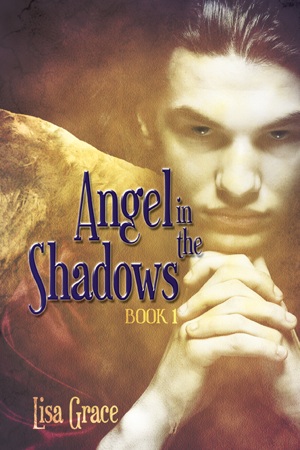It seems that most authors love the idea of seeing their books on the big screen — and the extra income from selling book rights to a movie producer doesn’t hurt either. But is a possibility as an independent author? Sure, you say, sell enough books and they’ll come knocking on your door, but do you have to sell zillions and become as famous as Amanda Hocking or Hugh Howey before someone approaches you?
Well, it happened to indie author Lisa Grace. She not only sold the rights to her books, but the first one is in production now. She’s here today to give some tips for those authors who’re hoping to see their characters being played by their favorite actors.
Getting a Movie Deal as an Independent Author with Lisa Grace
Can you tell us about what made you decide to self-publish and the events that led up to the movie deal?
 Thanks Lindsay for having me as a guest on your blog. I decided I would self publish on May 23rd, 2011 as an ebook after getting some interest from an agent who said he would shop around my book. Seven months later he tells me he was too busy with other clients and never got around to approaching anyone, but he thought it was good and he didn’t want me taking it to someone else. Luckily, I’d been writing book 2 in the meantime. So I self published them as ebooks only seven weeks apart. I made it to #1 on the Amazon sub genre lists for teen horror in the Kindle store, which is where two movie producers saw. it. It was bumped to #2 by the 1983 book , A Woman in Black which was being made into a movie starring Daniel Radcliffe, AKA Harry Potter.
Thanks Lindsay for having me as a guest on your blog. I decided I would self publish on May 23rd, 2011 as an ebook after getting some interest from an agent who said he would shop around my book. Seven months later he tells me he was too busy with other clients and never got around to approaching anyone, but he thought it was good and he didn’t want me taking it to someone else. Luckily, I’d been writing book 2 in the meantime. So I self published them as ebooks only seven weeks apart. I made it to #1 on the Amazon sub genre lists for teen horror in the Kindle store, which is where two movie producers saw. it. It was bumped to #2 by the 1983 book , A Woman in Black which was being made into a movie starring Daniel Radcliffe, AKA Harry Potter.
Movie producers do look at the best seller genre lists to find books that interest them. I went with the one I felt offered the best chance of getting the movie made. Motion Picture Pro Studios.
A few months later they sent me the contract, I hired an entertainment lawyer, and a few months after that, I had signed an option agreement for the first two books in my series. Angel in the Shadows, Book 1 is currently free at all major ebook retailers if your readers want to check it out. Motion Picture Pro Studios “exercised” the option, and the project is currently in development.
I think people assume you have to be a mega-seller to attract these guys. Do you mind sharing how many books you were selling at the time? Or perhaps how visible your books were (Top XX at Amazon?)?
Being at the top in your genre is important. They have to feel passionate about the project, and feel it will translate well to film. I’m very much a mid lister. I’ve made it to #13 in the free ranks back in the days when you could move 12,000 a day outside the romance genre. I’m not sure that’s as easy to do now. I slid in fairly high to the paid ranks coming off of free, but never stayed on op top of all Kindle books for very long. At that time, the only place my ebooks were available was on Amazon. I only opened distribution this year in December 2012, to more book stores.
Do producers always find your book on their own and come to you, or are you aware of any ways a moderately successful indie author can get in contact with them and suggest their title?
Producers are like book agents. They get pitched to all the time. They want to find projects on their own, and do. After all, it has to be something they feel passionate about. Shoot. I wish I could get them to be interested in all my books! I’d love to have everything I write optioned for a movie, but that isn’t likely to happen.
Every deal I know about, it’s been either a book agent pitching it to a director (who will read it first) or the producer reading the book and loving it.
You seem to have gained quite a bit of insight into how and why books get picked up. What genres or types of stories are more likely to attract producers?
It depends on what the producers like. Some skip around different genres, some stick with one. They’re just people who know what they like and what they can do with a project. Your best bet is to write a good book that makes it to the top of its genre so those who might be interested find it and read it. Also, some authors do have producers coming back to them again and again, because they’re writing books that will translate well to film.
In your guest post, you suggested writing, “A Simple Story in Seventy to One Hundred Scenes.” Can you talk a little about that for my audience here?
There are certain authors who get their books optioned all the time, because they write books that will translate well to film. By the way, you won’t be hearing from them, because they’ve got a wonderful second income coming in from optioning their stuff, and they don’t want you moving in on their market. I’ve heard from many of them privately.
One idea that helps is the “man in the box” type of writing, where scenes are set in one location. It makes a movie cheaper to shoot. Most movies are not huge blockbusters, and costs are a consideration.
Write a novel that can be broken down into seventy to one hundred scenes. Most movies are only going to be between an hour and half to two hours. There is a market for selling movies to TV and cable, after commercial release, and if your story takes longer to tell, your chances of getting a deal decrease. These suggestions come directly from producers (the money people with all the power, they sign the checks) that I’ve had discussions with.
You’ll get authors and scriptwriters who aren’t selling their stuff who disagree (I know because I’ve heard from them too), but I think I’ll listen to the ones signing the checks and so do the authors who are getting one book after the other optioned.
If there’s any parting advice you’d like to share, please feel free to do so.
Write the best book you can. Then write the next one. “See” your books as a movie in your head. Do think about costs when planning out settings. For instance, setting a book on a sinking cruise ship is a lot more expensive than setting it in a forest.
Watch movies in your genre (not block busters, but those with budgets of 2mil to 25mil) and take them apart scene by scene, so you get an idea of what a novel would need to include to translate well. I’d also suggest praying as it can’t hurt. Enjoy the journey because even if your book is optioned, it may never make it into development, and if it makes it into development, it may not make into pre-production. Movie making is a loooong process, so once you sign your option, kiss your baby goodbye, and start working on the next one.
~
Visit Lisa and check out all of her work on her website, or say hi on Twitter and Facebook. You can also hop over to Amazon or Smashwords to grab copies.





Movies that can be made on a budget, makes sense. Probably explains why not many of us epic fantasy authors get approached, indie or otherwise!
Hi Aaron,
Hugh Howey who ended up optioning his epic WOOL book to Ridley Scott (of Alien, Blade Runner fame) was trying to write a “man in the box” type book.
You can write an epic fantasy that would translate well to film (inexpensively) if you put some thought into the scenes.
I really enjoyed this post!
The ideas on writing 70 to 100 scenes seem like a good strategy for many authors. Lots of people have trouble finishing what they started, but if you can map out most of those scenes all the way to the end you’ll probably fare quite well.
And if that makes your novel that much more attractive to people writing checks, then hey, I’m all for it!
Hi Greg,
I agree! 🙂
Another great, informative post. Ironically, what I think I’ve learned is that I’m not interested in writing a movie-adaptable book. One of the things I love about writing is the lack of constraint–being able to let my imagination go crazy without having to worry about budgets or time limits or number of sets or other film-ability issues. Still, I appreciate the info shared here. Thanks Lisa and Lindsay.
I didn’t write my first or second one with that in mind, although I do “see” books in my mind unfolding visually. By the third book I started giving some thought to it.
I may write others in the future that have more restricted settings, especially if the first is successful. I’d love to have more books optioned.
I don’t look at it as a way of constricting my creativity, but a way of expanding it. Having worked in musical theater, we had to balance what we spent on talent, venue, costumes, musical rights, sets, drops, props, lighting, special effects, with how much we could charge for tickets and how many we could expect to sell.
I wouldn’t say any of those restrictions forced us to put out a “worse” product, but actually helped us expand our thinking of how we could “do it.”
Reading this post made me feel inspired to pursue my dream of starting a novel and translating it into film. Thanks for this and congratulations Lisa! 😀